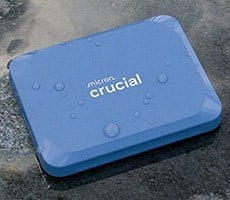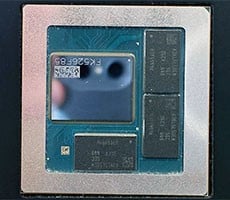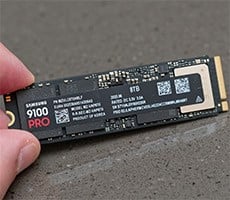SanDisk Extreme Portable SSD Review: Compact, Rugged USB-C External Storage
SanDisk SecureAccess: SanDisk SecureAccess is included with the Extreme Portable SSD. It creates an AES128-encrypted file on your SSD that acts as a vault for personal data. It's easy to setup, the program is pre-loaded on the drive, so all you need to do is run it in place should you want to take advantage of the encryption.
The program defaults to reasonably stringent guidelines, including 6+ character passwords, forcing upper and lower case characters, and requiring numeric characters, though you can turn these rules off. However, if you do, please refrain from using common passwords '1234' or 'password',

The SecureAccess software interface is a simple file browser. Simply drag files into this window, and your data is protected. SecureAccess travels with the drive, so it's always available.
You can manually log out of the program, but every time you remove the drive or shut down, the vault is locked. Reading files from the storage took only a few seconds and dropping new files in was just as fast.
Automatic file sync with folders on your boot drive is available as well, for a price. SanDisk and

Our Test Methodologies: Under each test condition, the Solid State Drives tested here were installed as external or secondary volumes in our testbed, with a separate drive used for the OS and benchmark installations. Out testbed's motherboard was updated with the latest BIOS available as of press time and AHCI (or RAID) mode was enabled, if present. The SSDs were secure erased prior to testing, and left blank without partitions for some tests, while others required them to be partitioned and formatted, as is the case with our ATTO benchmark tests. Windows firewall, automatic updates and screen savers were all disabled before testing. In all test runs, we rebooted the system, ensured all temp and prefetch data was purged and waited several minutes for drive activity to settle and for the system to reach an idle state before invoking a test.
|
|
|
Hardware Used: |
|
Relevant Software: |
|

SANDRA results were very good, besting the Extreme 510







